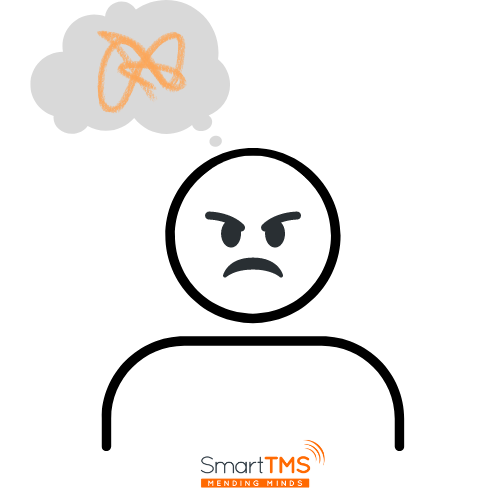Aggression and irritability during TMS treatment could indicate effective treatment
June 26, 2022 - Smart TMS

The Clinical TMS Society Conference
In May 2022, our CEO Gerard, and Lead Practitioner Athana, attended the 10th Annual Meeting for the Clinical TMS Society in Chicago. They presented Smart TMS original research here, and the conference also provided a great opportunity to explore and learn more about other areas of interest and research surrounding TMS treatment that are currently being utilised in the United States.
One study stood out at the conference, regarding the onset of aggression and irritability during TMS treatment.
The research study
It has previously been identified that the left and right prefrontal cortex (PFC), differ in how they are involved in emotional processing. Therefore using inhibitory rTMS on the right PFC causes an attentional bias towards angry faces. Yet rTMS at the left PFC causes an attentional bias away from angry faces.
In the Psychiatric Private Practice, 5 patients out of 31 experienced increased anger and aggression within the first 10 rTMS sessions, before they reached treatment remission.

These 5 patients completed 36 rTMS sessions, all of whom reported anger and aggression shortly after starting. The TMS was delivered as per standard protocol, of 3000 pulses at a frequency of 10Hz and an intensity of 120% rMT, over the left dorsolateral prefrontal cortex (DLPFC).
Results
Within the first 10 rTMS sessions, these patients experienced an increase in aggression and irritability, reporting:
“becoming aggressive and cursing at sister”
“feeling very irritable and jumpy”
“feeling anger, rage, afraid he will hurt someone”
“irritable, everything negative…..moods are just jumping around”
This aggression and irritability diminished in the second half of the treatment course, with patients reporting:
“less self harm, less irritable”
“irritability and depression have remitted”
“experienced a 180, feeling great”
“previous irritability almost gone”.
3 out of the 5 patients had their medication or TMS protocol adjusted at some point during treatment. Specifically in response to the increased aggression. All 5 patients entered remission after completing their course of 36 sessions, with 50% or more reduction in their BDI-2 score.
Conclusion
Experiencing an increase in feelings of aggression or irritability during TMS treatment may be a positive indicator of effective treatment. It may also be a useful predictor of reaching eventual remission.
In past research, the stimulation of the DLPFC has been shown to impact anger and aggression. However it’s link to successful treatment is yet to be elucidated.
Author, Alicia Chan,
Smart TMS, Bristol Practitioner.
Reference
Nasef, O. E., Fogelstrom, L., & Mednik, A. (2022). Increase in feelings of aggression or irritability during TMS may be a positive indicator of effective treatment.










